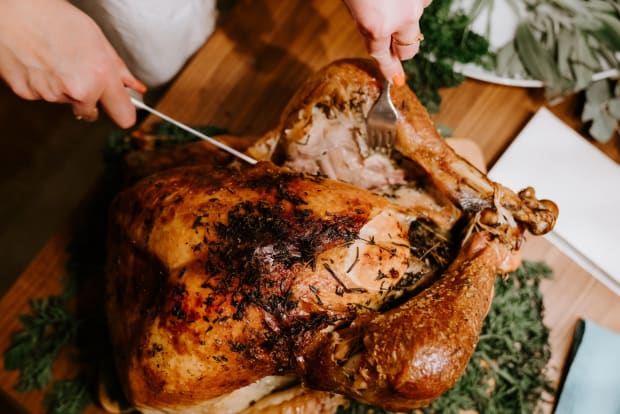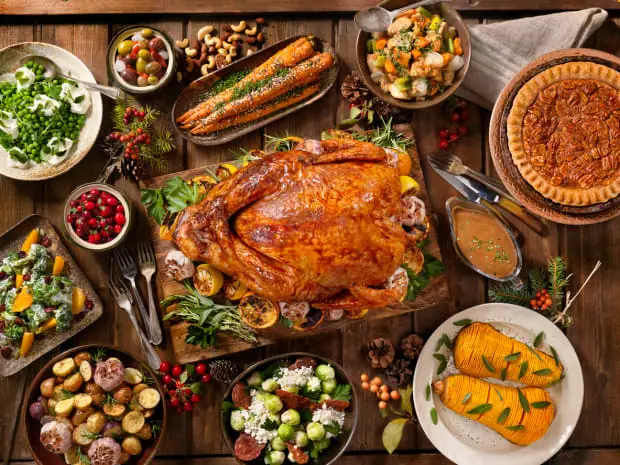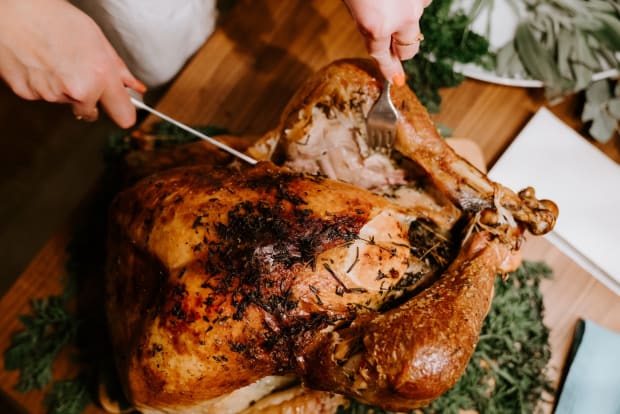5 Reasons to Choose a Heritage Turkey
A heritage turkey is an awesome choice for a traditional holiday meal.

Recognized as a turkey “Standard of Perfection” by the American Poultry Association since 1874, traditional heritage birds were nonetheless eclipsed by tender, milder, big-breasted breeds in the 20th century. The latter became so popular that not too long ago, heritage turkeys were on the verge of extinction, according to NBC News.
The outlet reports that as of 2001, there were only about a dozen Narragansett turkeys in the country; last year, there were over 15,000 heritage turkeys nationwide (still a small number as compared to the 280 million commercially bred turkeys, but it’s a good start).
Here are five reasons why more and more people are opting for heritage turkey on their Thanksgiving tables.
1. Heritage turkeys are more traditional.
Seeing as Thanksgiving is all about tradition, authenticity seems like a very good reason to opt for a heritage turkey.
While our forefathers certainly shot their own wild birds (or, let’s be honest, relied on the Wampanoag to source them…) farm-raised heritage turkeys, which are more consistent in flavor and texture than wild, are an excellent compromise. The Heritage Turkey Foundation recognizes ten specific heritage breeds, including Naraganasett, White Holland, Jersey Buff, and Bourbon Red.
Heirloom birds, while similar, are not quite the same thing as heritage turkeys. Think of heirloom turkeys as being a compromise: They combine elements of both heritage turkey and modern breeds, for a superior yield to true heritage turkey while still retaining an element of the rich flavor heritage turkey lovers crave.
Of course, you need to do your research to make sure you know what you’re getting: because there is no official certification program for the labeling of either heirloom or heritage turkeys, the words can be thrown around willy-nilly.
“I have seen people think they have heritage birds because they have dark feathers,” Frank Reese, a heritage turkey farmer in Kansas, tells Chowhound. “But the color of the feathers don’t mean a thing.”
Ask questions of your farmer or vendor to make sure that you’re getting the bird you want.
2. Heritage turkeys are (usually) more sustainable.
Heritage turkeys tend to be a more sustainable choice than supermarket turkeys, but once again, you’ll want to ask a few questions to make sure you know what you’re getting.
Most conventional turkeys are bred to have breasts so large that they can only breed via artificial insemination; heritage turkey, on the other hand, grows to a proportionate size, meaning that they can mate naturally. This is a good indicator of whether your bird is a true heritage turkey, so don’t be shy about asking your farmer about the way his or her turkeys are bred.

iStock/LauriPatterson
Heritage turkeys also tend to be slaughtered later than conventional turkeys – on average at about 28 weeks as opposed to 16 weeks for conventional. This is because heritage birds naturally grow at a slower rate. While this is one contributing factor to their higher price point, the other is that most farmers who opt to raise heritage turkeys also choose to incorporate other sustainable practices into their work.
“Choosing a sustainably raised bird for Thanksgiving means supporting farming practices that are respectful to the animals and the land, and which ultimately result in a wholesome and healthy turkey,” explains Heidi Diestel, organic heirloom turkey farmer at Diestel Family Turkey Ranch. “Our thoughtfully raised birds grow slowly and naturally, with plenty of fresh air and room to roam, whether indoors or outdoors.”
That said, do bear in mind that the terms heritage and heirloom turkey only refer to a breed: if you want to be certain that the farmer uses sustainable practices, you may also wish to opt for additional certifications, such as the Global Animal Partnership label that Diestel has earned. You can also find turkeys with antibiotic-free, vegetarian-fed, certified organic, Non-GMO Project Verified, and pasture-raised labels.
3. Heritage turkey is tastier.
Trying an heirloom or heritage turkey for the first time may be a bit surprising, because it will actually taste like something – a bit gamier and richer than most supermarket birds. This stronger flavor stems from both the heritage breeds themselves and the age of the bird at slaughter. The latter can also make these birds a bit more textured than the turkey you may be used to.
In a Bon Appétit taste test, while people found heritage turkey more flavorful, they also found it slightly drier; most experts recommend brining the turkey to ensure that it’s moist (read our guide on the Pros and Cons of Brining a Turkey). Others suggest roasting the breast and dark meat separately to ensure ideal flavor and texture in both portions of the bird.
4. Heritage turkey is healthier.
Heritage and heirloom turkeys also tend to be healthier – not because of any true differences in nutritional content between these breeds and conventional birds, but rather because of the way that they are raised.
Diestel, for example, notes that her birds, which are fed a vegetarian diet and given enough space to roam and remain healthy, do not need to be treated with antibiotics as so many conventional birds do.
These techniques aren’t just better for the health of those around your table; they also prevent the development of antibiotic-resistant superbugs (aka, they’re healthier for literally the whole population).
These methods are also particularly beneficial for those who work with the turkeys. As Bon Appétit reports, ammonia emissions from poultry waste can be harmful to the turkeys themselves as well as to workers working closely with them.
Heritage and heirloom birds also generally contain no additives, whereas conventional birds are often injected with a solution of water, salt, and flavorings before being sold.
5. It’s a better conversation piece than politics.
Holidays are always rife with uncomfortable questions about ex-boyfriends, alternative new haircuts, and five-year plans. What better way to change the subject than to say, “Hey, Great-Aunt Margie, what do you all think of this heritage turkey?”
Note: This article has been modified to clarify the difference between heirloom and heritage turkeys.
Related on Organic Authority
3 Authentic Thanksgiving Feast Ideas for Your Holiday Table
7 Vegan Thanksgiving Roasts for Your Plant-Based Holiday Table
5 Bespoke Autumn Cocktails for a Trendy Thanksgiving



